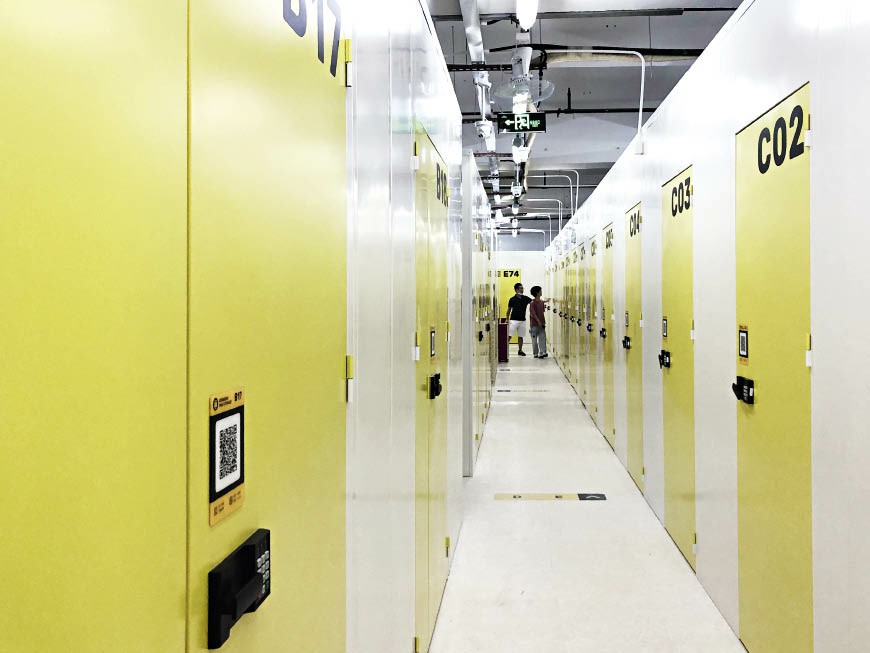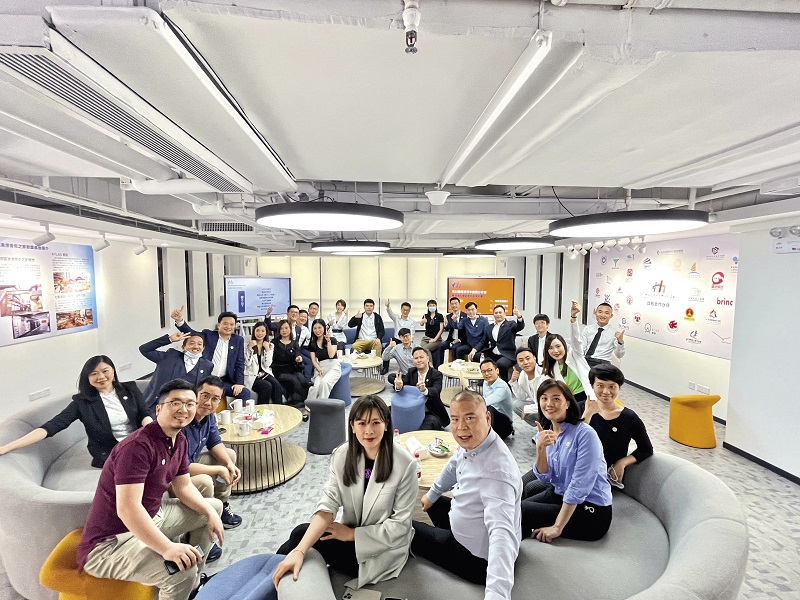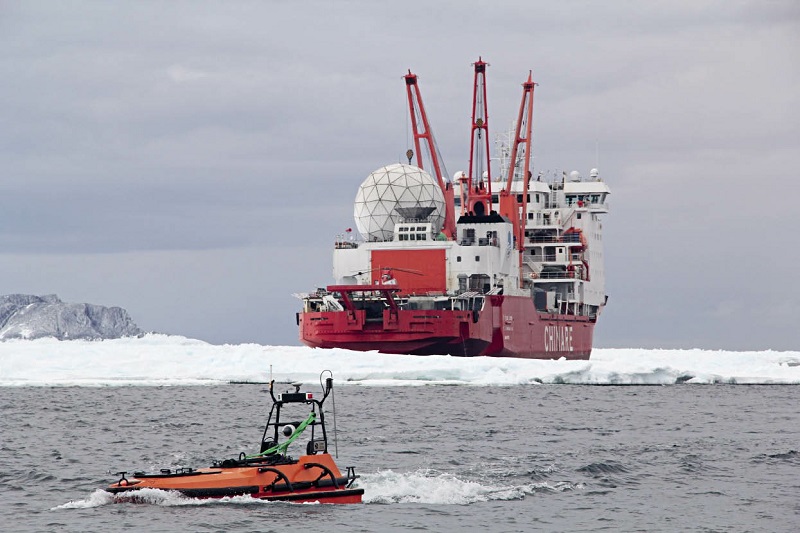In the Headquarters of Hong Kong and Macao Youth Association in Tianhe District, south China’s Guangzhou, visitors see road signs like Nathan Road and Queen’s Road — all familiar names to Hong Kong residents. Budding entrepreneurs are benefiting greatly from the workplace, which comprises a total of 100 offices with several other functional zones including a studio for livestreaming online influencers, a brainstorming room, a shared economy zone, and an open leisure area.
Terence Chan, founder and general manager of the entrepreneurial incubator at the headquarters, expressed his gratitude to the United Front Work Department of the Communist Party of China Tianhe District Committee, for their strong support for young entrepreneurs from Hong Kong and Macao. “Most of the space is free for users and more than half of it runs on the principle of a shared economy, so the incubator can provide better services for entrepreneurial projects,” said Chan.

From left to right:
Felix Wong, co-founder of the KINGKONG Mini Storage.
Terence Chan, general manager of headquarters of Guangzhou Tianhe Hong Kong and Macao Youth Association.
Poon Hung-fai, founder of Quacell Biotechnology Co., Ltd.
Zhang Yunfei, founder of Zhuhai Yunzhou Intelligent Technology Co., Ltd.
Stephen Zhang, apprentice lawyer at Zhuhai-based ZLF Law Office.

The design of the smart networked KINGKONG Mini Storage makes full use of urban space.
One-Stop Incubators Hatching Start-ups
KINGKONG Mini Storage is one of the first businesses to operate at the headquarters. The company provides storage space varying from room size to 1.47 cubic meters. Users scan the QR code with a smartphone to open the storage space.
“Along with the surging housing prices in Guangzhou, individuals and businesses need more economical storage space. Our project provides self-help storage services,” said Felix Wong, co-founder of KINGKONG Mini Storage. After graduating from the Chinese University of Hong Kong in 2010, he decided to work on the mainland. And now, his business is booming in Guangzhou and Shenzhen.
Traditional warehouses are locked by keys or key cards, but Wong’s company offers more. It uses the Internet of Things (IoT) technology. “All the hardware and equipment is purchased in the Greater Bay Area, where IoT hardware suppliers and technical service providers converge,” said Wong. Such supply support is very important to start-ups.
The integrated development of the Greater Bay Area has also made financing much easier. “Here, investment and financing is no longer limited to a certain city, but expanded to the entire Bay Area,” said Wong. He said his company is located in this region where equipment, chips, and intelligent accessories are all available. It helps reduce costs. In just four years, Wong has expanded his business to more than 20 branches in Guangzhou and Shenzhen.
The entrepreneurial incubator was officially inaugurated on October 20, 2019. To date, it has served more than 6,000 young entrepreneurs from Hong Kong and Macao, and helped more than 70 start-ups. It is a veritable “entrepreneurship greenhouse,” having successfully incubated eight companies with a market value of over RMB 100 million.
“It helps more HK and Macao young people integrate into the Greater Bay Area and get on the express train of economic development on the mainland,” said Chan. “I knew the place from a friend. It is a great platform where people like me can share and learn,” said Wong. Thanks to the free help of the headquarters, Wong found it much easier to start the business from the initial market research to business registration, taxation procedures, and recruitment.
“It is a place where young people from Hong Kong and Macao share the benefits of the mainland’s development,” said Terence Chan.
Young entrepreneurs pursuing their business dreams here do not have to worry about the housing problem. There is a special apartment building as a matching project for the business incubator. It has accommodated more than 3,000 young entrepreneurs since its opening.

Young entrepreneurs at the headquarters of the Guangzhou Tianhe Hong Kong and Macao Youth Association.
Industrial Clusters Bolster Sci-Tech Achievement Commercialization
Poon Hung-fai, founder of Quacell Biotechnology Co., Ltd., is optimistic about the development of the Greater Bay Area. After receiving his doctorate in the United States, Poon, who was raised in Hong Kong, returned home and founded a company in Zhongshan in 2018. The number of his employees has increased from 12 to more than 100 and the size of his laboratory expanded from 900 to 7,000 square meters. In three years time, Poon’s company has won the recognition of many bio-pharmaceutical and bio-technology companies at home and abroad.
The opportunity comes from the rapid development of China’s bio-pharmaceutical industry over the past decade. “It is beyond my imagination. When I came back, there were probably only 20 domestic bio-pharmaceutical companies; however, when I started my own business, there were more than 100,” said Poon.
When choosing to start a business in Zhongshan, Poon took many aspects into consideration. “The bio-pharmaceutical industry is very mature in Zhongshan. The local government has been rolling out preferential policies and providing support with matching industries.” More importantly, Poon discovered that the government is quite familiar with the industry and can provide what businesses really need. In February 2019, the Outline of the Development Plan for the Guangdong-Hong Kong-Macao Greater Bay Area was officially issued, in which China pledged to support Zhongshan in spurring innovation in the bio-pharmaceutical sector.
“The earlier we entered the Greater Bay Area, the more opportunities we could grasp,” said Poon. In his view, Hong Kong and Macao offer an easy gateway for businesses to go global, and the preferential policies for the bio-pharmaceutical industry in Zhongshan are a boon for his company, making him more confident of the future.
In the coastal city of Zhuhai, Zhang Yunfei, a graduate from the Hong Kong University of Science and Technology, together with his team, founded China’s first unmanned boat company, Zhuhai Yunzhou Intelligent Technology Co., Ltd.
“We were born in a good era, which enables us to ride on the trend of development policies in special economic zones, as well as the unimaginable opportunities for the Greater Bay Area,” said Zhang. For him, starting a business in Zhuhai was a measured decision, considering its abundant marine resources, sound environment, low cost of living, and various incentives for entrepreneurship and innovation.
In 2013, with the guidance of the Zhuhai municipal government, Zhang’s company signed up for the second China Innovation and Entrepreneurship Competition, and claimed the champion title, successfully receiving the first round of financing. Doing business in the boat making sector is no easy task. Just the trial sailing alone needs coordination with various departments including those responsible for maritime affairs and border defense. “The local government and competent departments in Guangdong Province have offered lots of support,” said Zhang.
According to Zhang, the strong industrial chains in the Greater Bay Area lay a solid foundation for the development of hi-tech equipment and advanced manufacturing. He said that many researchers of his team had graduated from the Hong Kong University of Science and Technology and Macau University of Science and Technology, and are professionals in the field of unmanned boats.
The “Zhuhai Talent Program” and other preferential policies are attracting innovative and entrepreneurial talent, so more and more Hong Kong and Macao college graduates come to the mainland in pursuit of their dreams. “Hong Kong and Macao universities have strong capability in technological research, but due to the limited industries, there is little demand for cutting-edge technologies,” said Zhang.

In November 2017, the Yunzhou unmanned boat accompanies the icebreaker Xuelong to begin China’s 34th Antarctic scientific expedition, providing geospatial data for the construction of a new station.
Eligible Professional Qualifications
Located in Hengqin Creative Valley in Zhuhai, the ZLF Law Office is China’s first joint venture in legal services established by law firms from the mainland, Hong Kong and Macao. It has provided legal services to many clients from the Chinese mainland, Taiwan, Hong Kong, Macao, and Portuguese-speaking countries, intensifying the cooperation between those law firms and further promoting the liberalization of trade in services.
“It is pioneering and of milestone significance. I am honored to be a part of the company,” said Stephen Zhang, an intern at ZLF Law Office. A graduate with a master of laws degree, Zhang passed the national bar exam and has been working in Hengqin for half a year.
“Every workday, I take a bus from my home in Macao to the law office in Hengqin. The inter-city commute takes me only one hour,” said Zhang, who finds it very convenient to commute between the two cities. “Vehicles with Macao plates can enter or leave Hengqin directly,” Zhang added.
Hengqin Island faces Macao across a river, with the closest land being 187 meters apart. The island is connected with Hong Kong and Macao — the two international free trade ports — via the Hong Kong-Zhuhai-Macao Bridge and the Lotus Bridge. Such a unique geographical location makes the Hengqin New Area a window for Hong Kong and Macao youths to learn about the policies on the mainland and pursue their dreams of entrepreneurship and career.
“The scope of legal services in Macao is relatively narrow, while on the mainland there is a broader market with diverse demands. This can enrich my experience and insights,” said Zhang, who added that many fields are new and challenging, and many of the legal affairs need innovative cross-border and cross-jurisdiction cooperation within the framework of the “one country, two systems” policy.
In the joint venture law firm, Hong Kong and Macao lawyers provide consultation services related to local laws and regulations in Hong Kong and Macao. When it comes to mainland law, there are also specialized lawyers. “If we pass the Greater Bay Area bar exam in the future, we can also practice law on the mainland, which will bring more opportunities to Hong Kong and Macao lawyers,” said Zhang.
On October 5, 2020, the State Council issued the Measures for Hong Kong Legal Practitioners and Macao Practicing Lawyers to Obtain Mainland Practicing Qualifications and Practicing Lawyers in Nine Cities of the Guangdong-Hong Kong-Macao Greater Bay Area. According to these measures, eligible Hong Kong legal practitioners and lawyers in Macao who have passed the Greater Bay Area Lawyer’s Practice Examination and obtained the lawyer’s practice certificate can engage in mainland legal services within a certain range.
Speaking of the future, Zhang hoped that more young people from Macao can participate in the development of the Greater Bay Area, not only contributing their strengths, but also gaining more professional development.
Why do so many young people from Hong Kong and Macao choose to start their careers on the mainland? The youths all mentioned the huge potential and unlimited opportunities in the future development of the Greater Bay Area. And what is more important is the strong support of the government. “Young people gather in the Greater Bay Area to pursue a common dream, and the government’s favorable policies have also provided us with a more convenient living and working environment, as well as valuable development opportunities,” said Zhang.